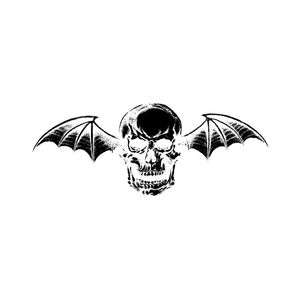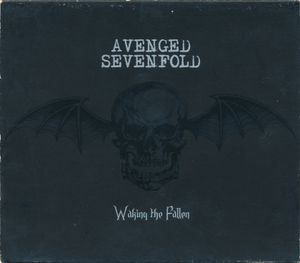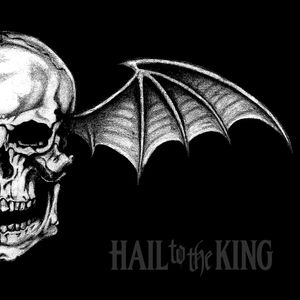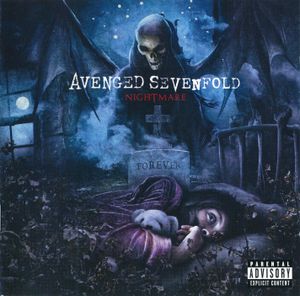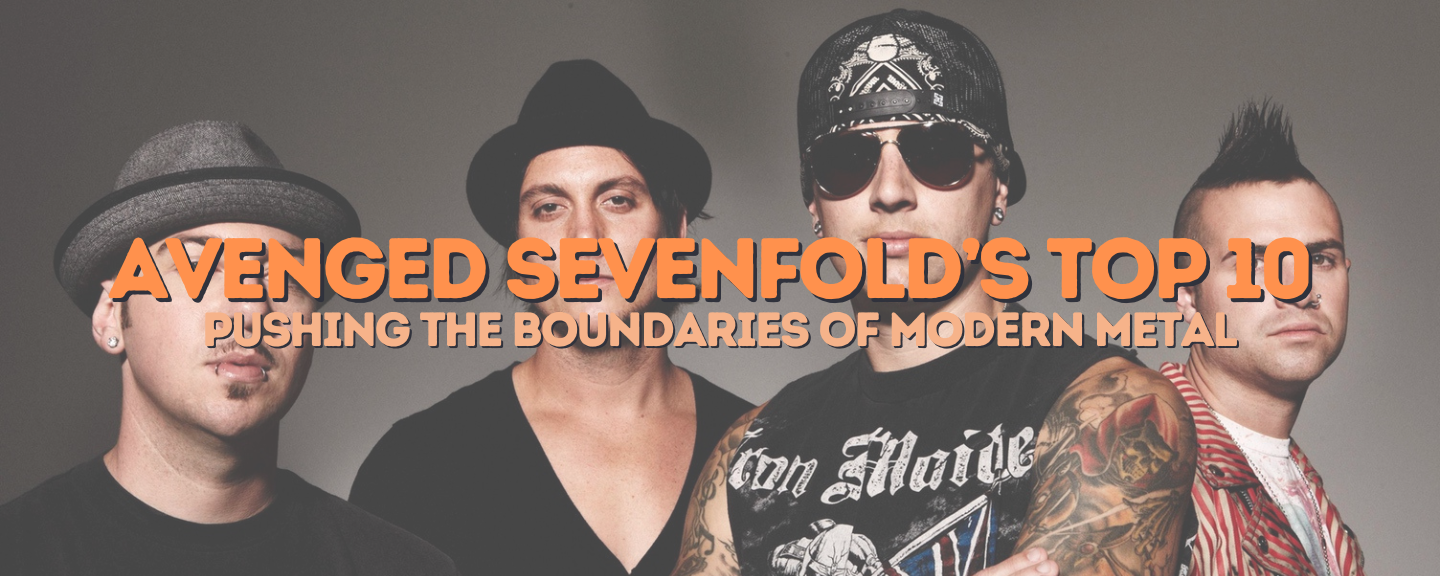
Avenged Sevenfold: Pushing the Metal Boundaries
Listen on Spotify
Avenged Sevenfold (A7X), the Huntington Beach, California heavy metal titans, exploded onto the scene in 1999. Their current lineup—M. Shadows (vocals), Zacky Vengeance (rhythm guitar), Synyster Gates (lead guitar), Johnny Christ (bass), and Brooks Wackerman (drums)—continues to deliver their signature blend of hard-hitting riffs and dramatic flair.
Initially emerging with a metalcore edge on their debut, Sounding the Seventh Trumpet, and solidifying that sound on Waking the Fallen, A7X dramatically shifted gears with their major label breakthrough, City of Evil. This album marked a transition to a more classic heavy metal style, a path they further explored on their self-titled release. Their ascent to mainstream success was tragically interrupted by the death of founding drummer Jimmy "The Rev" Sullivan in 2009. Undeterred, the band, with the assistance of Dream Theater`s Mike Portnoy, delivered the emotionally charged Nightmare in 2010, their first #1 debut on the Billboard 200.
Arin Ilejay took over drumming duties in 2011, contributing to Hail to the King (2013). This album, Ilejays only with the band, showcased a powerful blend of heavy metal and hard rock, reflecting A7X’s deep respect for their musical influences. From metalcore beginnings to their current mastery of a more traditional, yet undeniably unique heavy metal sound, Avenged Sevenfolds journey is a testament to their resilience and artistic evolution.
From the frenetic dual guitars of “Bat Country” to the dark theatricality of “A Little Piece of Heaven,” Avenged Sevenfold has redefined what modern metal can be. In this countdown, we explore ten of their most dynamic and influential tracks, each reflecting the band’s flair for technical precision, powerful storytelling, and fearless experimentation. Whether you’re new to their music or a die-hard fan, these songs capture the energy and ambition that make Avenged Sevenfold a driving force in heavy music.
Selection Criteria
These songs were selected based on cultural impact, musical innovation, streaming popularity, and their significance in the band's discography.
The Top 3
A Little Piece of Heaven
Avenged Sevenfold • 2007Perhaps their most theatrical and macabre piece, “A Little Piece of Heaven” from Avenged Sevenfold is an eight-minute mini-opera complete with orchestral arrangements, choral vocals, and a storyline straight out of a horror flick. The band leans into dark humor and graphic imagery, narrating a twisted tale of love, murder, and the undead. It’s a testament to their fearless creativity, blending showtune-like sections and carnival-esque interludes with their standard heavy approach. Its greatness lies in its unabashed flamboyance and the band’s commitment to pushing boundaries. Despite its shocking themes, the track is incredibly catchy, using upbeat melodies to contrast the grisly subject matter. The Rev’s contributions to writing and singing are particularly noteworthy, adding another layer of personality to this twisted love story. Though divisive among casual listeners, “A Little Piece of Heaven” is often hailed by fans as one of Avenged Sevenfold’s most inventive endeavors.
Unholy Confessions
Waking the Fallen • 2003From their 2003 breakthrough album Waking the Fallen, “Unholy Confessions” introduced many fans to Avenged Sevenfold’s early mix of metalcore intensity and melodic flourishes. The dual guitars lock into a thrilling interplay, weaving harmonies that hint at the classic metal influences that would become more pronounced in later records. M. Shadows’ vocal delivery alternates between screams and clean singing, a testament to the band’s willingness to experiment with different styles. Beneath the high-powered music, “Unholy Confessions” explores themes of betrayal, guilt, and emotional turmoil. The raw production and youthful energy give the song an authentic, unpolished edge that endears it to longtime fans. As one of the band’s earliest hits, it represents a pivotal moment where Avenged Sevenfold began refining their signature fusion of aggression and melody—a formula that would eventually carry them to mainstream success.
Critical Acclaim
Avenged Sevenfold • 2007Opening Avenged Sevenfold with a sense of purpose, “Critical Acclaim” launches into a head-spinning barrage of drums and guitars. The song tackles political and social critiques, with M. Shadows and The Rev (on backing vocals) both voicing frustrations about media bias and societal complacency. Stylistically, it balances aggression with occasional melodic breaks, creating a rollercoaster effect that mirrors the heated subject matter. What makes “Critical Acclaim” stand out is its willingness to address controversy head-on. Rather than relying solely on dark fantasy or personal struggle, the lyrics delve into current events and question mainstream narratives. This sense of social awareness adds depth to Avenged Sevenfold’s repertoire, showcasing their ability to channel anger and disillusionment into a head-turning, riff-packed protest song.
Honorable Mentions
Seize the Day
Proving their versatility once again, “Seize the Day” off City of Evil trades relentless riffs for a more melodic, ballad-like approach. The acoustic guitar intro sets a reflective tone, followed by gentle vocal lines that emphasize the fragility of life. Lyrically, it’s a call to cherish each moment and fight against regret—an unexpectedly tender message within the band’s often dark or aggressive discography. The excellence of “Seize the Day” lies in its simplicity and emotional resonance. The chorus swells with heartfelt intensity, and the guitar solo soars with the kind of soulful phrasing that complements the song’s reflective nature. Although it diverges from the heavier fare that typically defines Avenged Sevenfold, “Seize the Day” demonstrates that powerful storytelling and genuine sentiment can thrive in a metal band’s catalog when executed with sincerity and skill.
Beast and the Harlot
From the hard-hitting album City of Evil, “Beast and the Harlot” kicks off with a cinematic flourish that evokes images of biblical prophecies and grand-scale battles. The song references the Book of Revelation, drawing on apocalyptic imagery to create a sprawling, dramatic narrative. Musically, it’s a showcase for each band member: The Rev’s rapid-fire drum fills, Gates and Vengeance’s harmonized leads, and M. Shadows’ powerful vocal range. Lyrically, “Beast and the Harlot” criticizes corruption and decadence, setting the band’s dark, biblical metaphors against searing guitar work. The fast-paced tempo and complex riffs underline the urgency of the message, immersing the listener in a turbulent world on the brink of destruction. This fusion of virtuosity, lyrical depth, and cinematic flair highlights why Avenged Sevenfold stood out in the mid-2000s metal scene—capable of delivering both high drama and headbanging intensity.
Almost Easy
Also from the Avenged Sevenfold album, “Almost Easy” opens with relentless drumming and a chaotic flurry of guitar lines, immediately plunging the listener into high-octane territory. M. Shadows’ vocals oscillate between harsh declarations and infectious melodies, reflecting the tension between anger and vulnerability that marks much of the band’s work. The song’s chorus is particularly catchy, making it a favorite among fans who appreciate both heavy riffs and sing-along hooks. On a deeper level, “Almost Easy” delves into self-doubt and the struggle to take responsibility for one’s actions. The contrast between the furious instrumentation and introspective lyrics captures the essence of Avenged Sevenfold’s appeal: complex emotions delivered via adrenaline-pumping metal. This track helped secure the band’s reputation for combining top-tier musicianship with relatable themes, forging a deep connection with their audience.
Afterlife
Featured on the self-titled album Avenged Sevenfold, “Afterlife” begins with an orchestral flourish that quickly explodes into a driving metal groove. The Rev’s drumming propels the track forward with quick fills and a galloping beat, while Synyster Gates delivers a soaring guitar solo that highlights the band’s flair for melodic intricacy. The song balances blistering speed with dramatic, symphonic elements, creating a grandiose soundscape. Lyrically, “Afterlife” contemplates themes of mortality and regret, suggesting that the afterlife may hold more emotional baggage than one expects. This introspective angle pairs well with the dynamic composition, which shifts between ethereal string sections and crushing riffs. It’s an excellent example of Avenged Sevenfold’s ability to blend aggression with a sense of theatricality, and it’s widely considered one of the band’s most musically ambitious tracks.
Hail to the King
The lead single from the album of the same name, “Hail to the King” finds Avenged Sevenfold leaning into a stripped-down, groove-oriented style. It’s a deliberate nod to classic metal influences like Black Sabbath and Metallica, with thick, chugging riffs and a steady drumbeat anchoring the composition. M. Shadows employs a commanding vocal delivery, echoing old-school rock and heavy metal frontmen. In stark contrast to their more intricate, rapid-fire guitar duels, “Hail to the King” thrives on a less-is-more approach. This shift allowed the band to highlight each note and drum hit, creating a darker, more forbidding atmosphere. Despite its departure from their usual complexity, the track’s epic scale and regal swagger captured listeners’ attention worldwide. It remains a staple of Avenged Sevenfold’s live shows, proving that sometimes a simple, crushing riff can be just as impactful as any high-speed shred.
Nightmare
As the title track from Nightmare, this song marked a pivotal point for the band following the untimely passing of drummer Jimmy “The Rev” Sullivan. The haunting intro on church bells sets a macabre tone, soon giving way to thunderous riffs and a driving rhythm courtesy of Mike Portnoy’s guest drumming. M. Shadows’ vocal performance stands out for its emotional intensity, reflecting both rage and sorrow in the wake of the band’s personal tragedy. Beyond its dark subject matter, “Nightmare” showcases Avenged Sevenfold’s ability to craft multifaceted compositions. The chorus is undeniably catchy, while the bridge offers a menacing breakdown punctuated by intricate guitar work. In many ways, the song became an anthem for the band’s resilience, a testament to their skill in channeling grief into a cathartic musical statement. Its commercial success further cemented the band’s status as modern metal heavyweights.
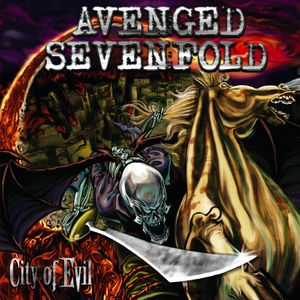
Bat Country
Inspired by Hunter S. Thompson’s Fear and Loathing in Las Vegas, “Bat Country” from the album City of Evil catapulted Avenged Sevenfold into mainstream recognition. The opening riffs set a frenetic pace, blending elements of modern metal, hard rock, and even a dash of classic metal virtuosity. Synyster Gates and Zacky Vengeance trade off blazing dual guitar harmonies, a hallmark that would become part of the band’s signature sound. M. Shadows’ vocals shift between melodic hooks and aggressive shouts, capturing the chaotic energy of the song’s psychedelic inspiration. Lyrically, “Bat Country” touches on excess, paranoia, and the blurred lines between fantasy and reality. This thematic tension is emphasized by the music video’s surreal imagery, reinforcing the band’s flair for the dramatic. The track’s intricate solos and unpredictable structure showcased Avenged Sevenfold’s technical prowess, proving they could write a radio-friendly single without sacrificing their metal roots. Even today, “Bat Country” remains a live favorite that perfectly encapsulates the group’s knack for merging intensity with accessibility.
Final Thoughts
This ranking represents the pinnacle of Avenged Sevenfold: Pushing the Metal Boundaries artistic achievement. Each song has earned its place through a combination of cultural impact, musical innovation, and enduring popularity.
Cultural Impact
Songs that shaped music history and influenced countless artists
Fan Favorites
Tracks with millions of streams and lasting popularity across generations
Last Updated: 4/2/2025

